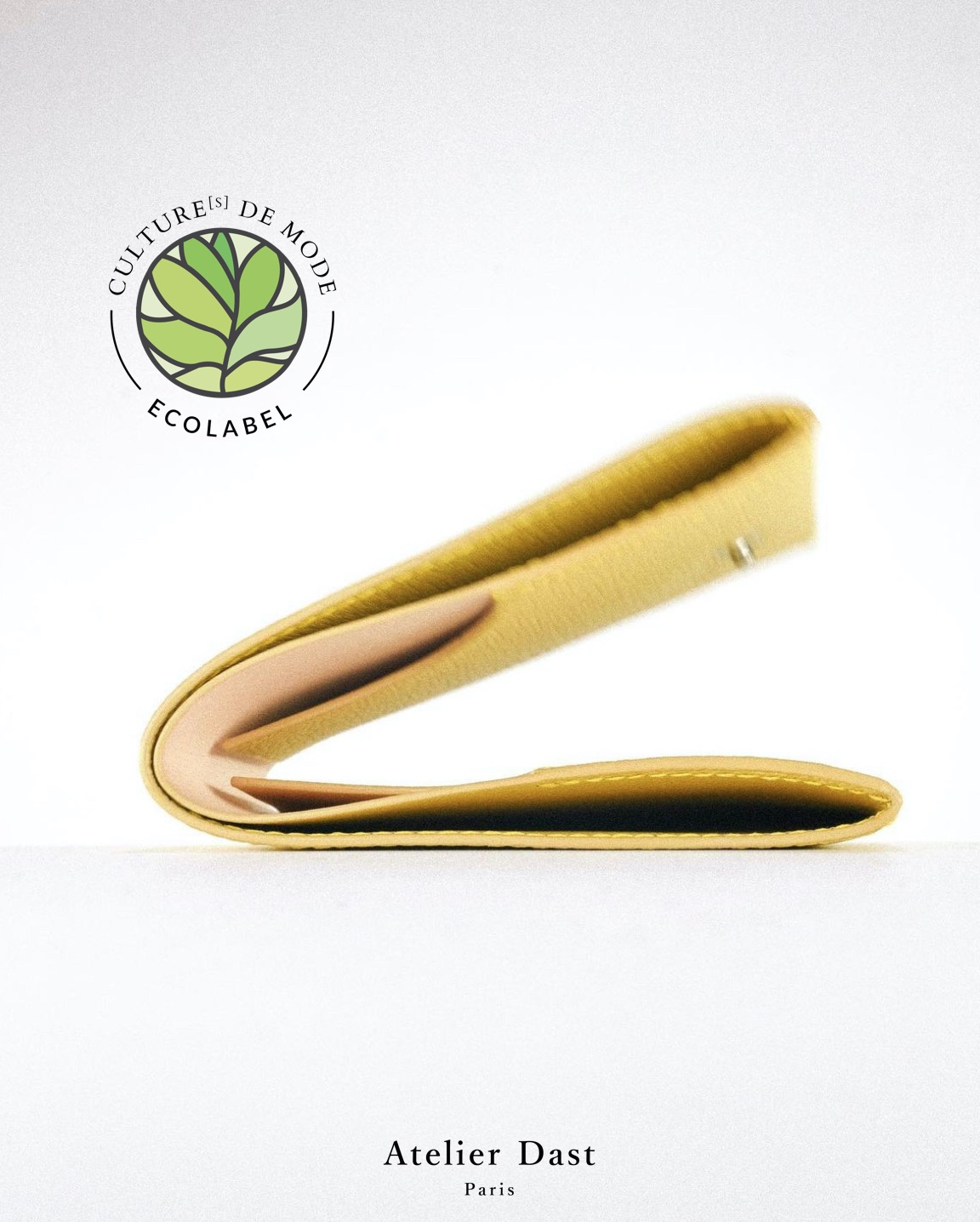CERTIFICATION
CERTIFICATION

Culture[s] de Mode Ecolabel
The Culture[s] de Mode Ecolabel was created to highlight and support the actors of the Métiers d’Art and the Made in France sectors. Those who are awarded with this label are recognized for their commitment and contribution to raising awareness about ecological and social issues of our time. The Ecolabel is supported by the Institut Français, an essential player in France's foreign cultural policy which aims to defend, preserve and promote the transmission of know-how, support local employment and be part of the transition to an ecological approach. The Culture[s] de Mode Ecolabel is made up of 4 criteria: Material, Traceability, Circularity, and Transmission & Training.
These criteria are based on the quality of the creation process within a viable economic model that is linked to the local production, which leads to ecological transition and highlights the relational activities, where transmission and training play a prominent role.

MATERIAL
Material is defined by the substance that craft or industrial businesses use to produce objects. But nowadays, to be sustainable, an object can only be thought of through the interconnections of the processes, meaning that our relationship with materials can no longer be a simple consumption of material. Nowadays, the use of materials is thought of in terms of resources and renewability, as much as in terms of ecological and social impact.
Leather is a by-product of the food chain, namely the milk and meat industries. We are keen to promote this bio-waste which, thanks to the know-how of tanneries and mégisseries, is the result of the transformation by tanning of a decayable material, the hide, into a durable and rot-proof product, leather.
Eco-design is at the heart of our approach, which means that it is very important to keep the product’s lifespan in mind when creating a new model. That’s why the use of leather in the making of fashion accessories is therefore obvious because, as demonstrated by an MPDI study published in February 2021 on Comparing the technical performance of leather, imitation leather and new alternative materials (Comparaison des performances techniques du cuir, du simili cuir et des nouvelles matières alternatives en vogue), leather is much more resistant to traction, bending and tearing than plant-based alternatives.
Therefore, contrary to popular belief about vegan material used to replace leather, which is an idea flirting with greenwashing, leather is, and always will be, the most sustainable natural material for creating fashion accessories.

TRACEABILITY
Traceability refers to the possibility of identifying the origin of a substance, product or merchandise, from its production to its distribution. Traceability therefore corresponds to the ability to identify and trace the history, distribution, location and use of products, components and raw materials, but also to guarantee the reliability of sustainability declarations, in areas of human rights, labor (including health and safety), environment and anti-corruption policy.
The leathers used in the making of our accessories are all tanned in France and come exclusively from French suppliers. We either purchased directly from French tanneries and mégisseries or purchased from French resellers, depending on the quantity minimums allocated for each order. The tanneries and mégisseries with which we collaborate are all recognized for the quality of their leather, their expertise in tanning and finishing, and for their commitment to sustainable development and traceability.
Furthermore, it is important to note that French tanneries and mégisseries are subject to both French and European legislation including regulations on environmental protection (ICPE) and notably must work in compliance with the European REACH regulation, which protect consumers in terms of product safety and elimination of hazardous substances. In other words, the standards applied to our leather suppliers are the highest in the world!
Lastly, our accessories are handmade near Paris by our craftsman, respecting traditional techniques of saddlery-leather goods, from the design to the finishing touches.

CIRCULARITY
Circularity is a sustainable approach which consists of producing goods and services that aim to limit the waste of resources and the production of waste. In the circular economy, each new product is designed in such a way that, at the end of its life, it becomes the raw material for a new product. This is an action that goes beyond recycling and consists of reusing what can be used of an old product to make something else.
As a craft company, we guarantee the repair of all our objects because we are convinced that it is the key to sustainability. In this case, our customers are invited to send us photos and to detail their request by email to the following address:
Regarding the scraps of our own production, we store them in our workshop and redistribute them free of charge to students in fashion or applied arts schools who need them for the creation of their own projects.
Finally, the other scraps are simply reused to make the labels for our packaging.

TRANSMISSION & TRAINING
The action of transmitting and preserving the know-how is at the heart of French craft businesses. Those workshops aim to highlight the Métiers d’Art: sharing skills and training younger generations which opens up dialogue and leads to collective enrichment. The transmission of these traditional practices through courses, exhibitions, guided tours or workshops is fundamental to guarantee the existence and survival of these artistic professions.
This is why we are keen to speak as regularly as possible in universities to present our business model and its creative strategy. Generally, we speak to master's degree students specializing in fashion: The American University of Paris, Université Paris 1 Panthéon-Sorbonne…
But in the coming months, we also hope to offer workshops open to all in order to showcase the specificities of leather and the know-how of saddlery-leather goods to a wider audience.
